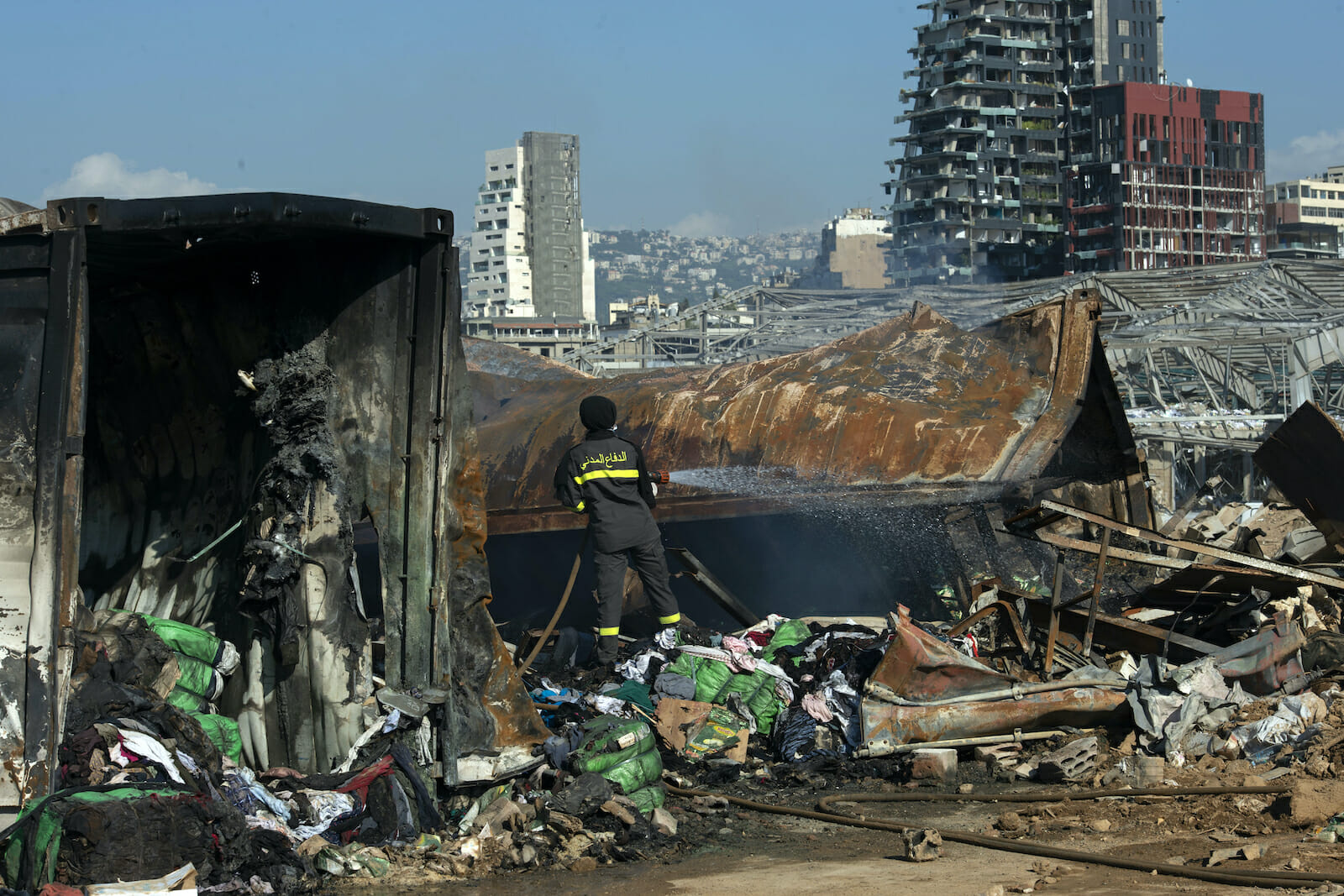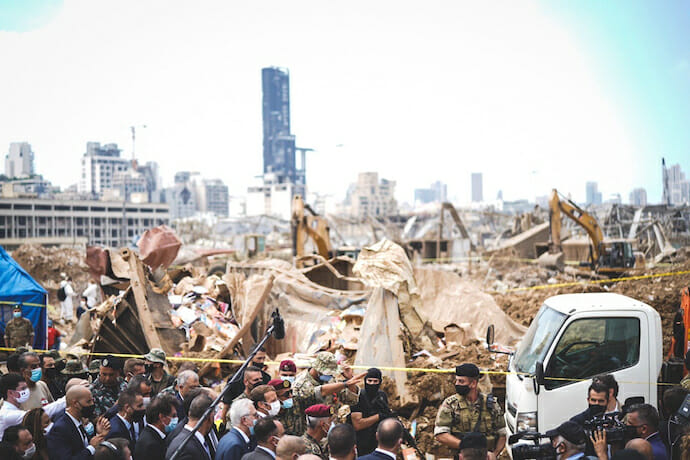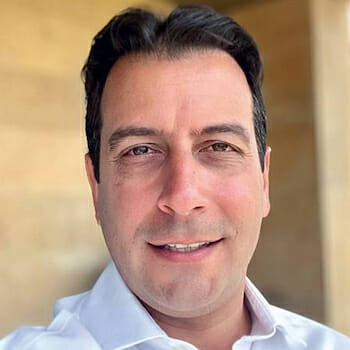
One Year of Love and Hate in Beirut
Lebanon has witnessed rather tumultuous circumstances over the past 365 days, which go far beyond the standard angst over the calendar year 2020 that pervades the globe. The country’s roller-coaster year started not with coronavirus lockdowns in March, but several months earlier, when a self-styled “revolution” took to the streets in a massive popular mobilization against the political class on October 17, 2019.
Hundreds of thousands all over the country, representing groundbreaking unity among the country’s famously rivalrous religious factions, made their voices heard in an unprecedented way, at least at first. The precipitating cause: a proposed tax on WhatsApp that disproportionately affects the poor, considering that telecom costs in Lebanon are among the world’s highest. But the full list of grievances was long, and as a result of popular pressure, the then-prime minister, Saad Hariri, stepped down rather swiftly. An interim government took over after a couple of months, but it had no real power and ultimately amounted to a proxy for the parliamentary majority. But by then the world had gone into lockdown and fear of a runaway pandemic overtook political considerations.
Then, seemingly resulting from the country’s current political instability but in reality uncoupled from it, the economy began to unravel as a 30-year dollar peg to the Lebanese lira could no longer be sustained by the dubious accounting tricks of Lebanon’s Central Bank. The country’s middle class began to fear that its days were numbered.
Then, as if months of dealing with the difficulties of keeping an import-dependent economy afloat in light of a dangerous pandemic and an 80% devaluation of currency weren’t enough, on August 4, Beirut witnessed one of the largest explosions in history. The blast took over 180 lives and badly damaged thousands of homes in Beirut.
Though there is now consensus on the culprit being 2,750 tons of ammonium nitrate left unsecured in the port area for nearly 6 years, “Beirutshima” may as well have been an atomic bomb for all the trauma it inflicted on the city’s residents. Just as they started to turn the corner, a huge fire erupted only a few hundred yards away from the original blast site, allowing toxic soot to waft directly into their homes, as tens of thousands of windows shattered in the blast had still not been replaced. Lebanon just can’t seem to catch a break over the past year.

Ironically, though, Beirut was a city full of love in the aftermath of the blast. People worked hand-in-hand to search for bodies, remove debris, and provide moral support for those traumatized. What began simply as a communal effort to clean streets then extended to fixing residences. Devoted volunteers demonstrated real solidarity in the infuriating absence of any government assistance.
But this camaraderie masks deep hate directed at the political class. The city’s youth in particular want justice, especially for the explosion, which struck the hearts of those previously oblivious to political life and awakened them to the notion of accountability. French President Emmanuel Macron bolstered this epiphany by speaking truth to power during his two visits.
His ongoing public shaming of the entire political class, as opposed to turning a blind eye to the corrupt behavior of anyone not affiliated with Hezbollah, was a first for a foreign leader. Macron gave voice to those becoming politically active today. They abhor the thought of another “national unity” government run by the same rotten leaders, which would seem to be the most likely political outcome under normal circumstances.
Yet Lebanon’s entrenched elites do not seem to have gotten the message. The interim government led by Hassan Diab resigned after the explosion, prompting the establishment to designate a respected diplomat named Mustapha Adib as their next choice for prime minister. He gave the formation of a new government of independent technocrats, as demanded by Macron and other international stakeholders, the old college try. But the recalcitrant political class wouldn’t budge, so Adib threw in the towel. His withdrawal represents a victory for the elites, as they think they can preserve the status quo. (The fact that Diab and Adib are anagrams borders on self-parody.)
Meanwhile, we now approach the one year anniversary of the initial street protests. The angry volunteers and activists bandy about demands of mass resignations of the political class and a new social contract. Can the ambitious wishes of political neophytes be taken seriously? Similar anti-establishment sentiments ruled the streets a year ago and their “revolution” ultimately amounted to very little. After they forced Hariri to resign, which was not a very heavy lift considering his fecklessness, the movement faltered.
But that was then, and this is now. The majority of the country no longer has much left to lose, especially due to the currency collapse. Their future has been robbed from them one dreadful event at a time, and the youth, in particular, do not believe that the monetary crisis or the explosion are decoupled from the ongoing political shenanigans.
The anger behind those frustrations could soon lead them to a more violent reprise of October 17, escalating until they convince their apathetic elders to help oust the establishment. The question is, would Lebanon be one of the rare cases where youthful anger actually manages to swing the balance in favor of change? If new elections did happen, Lebanon’s electoral parameters could support a parliamentary clean-out. But it will require much more than rage or naivety. Popular oppositions only succeed if they produce viable leaders who understand the game of politics.
All of that remains to be seen. Unfortunately for those many thousands who protested against their government a year ago, the movement produced no leadership. From a practical political point of view, an entire year has been wasted, a fact made astonishingly clear during Macron’s two visits. No serious political opposition managed to meet with him or position itself as a realistic alternative. So the odds do not favor the street leading to lasting political change.
Previous generations of Lebanese gave lip service to ousting corrupt leaders, but ultimately elected them back to power time and time again. It is up to the youth – acting out of love for their country and hate of the criminal negligence of their rulers that has robbed their future – to change the parameters.


